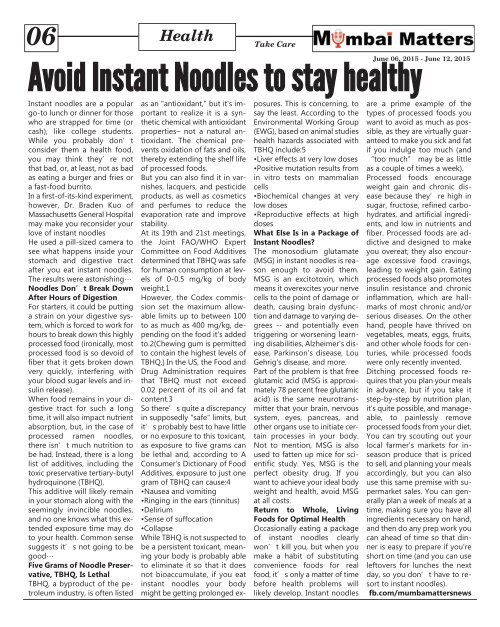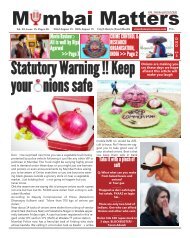7th June
The All New Mumbai Matters , New Logo, New Layout
The All New Mumbai Matters , New Logo, New Layout
You also want an ePaper? Increase the reach of your titles
YUMPU automatically turns print PDFs into web optimized ePapers that Google loves.
06 Health<br />
Take Care<br />
<strong>June</strong> 06, 2015 - <strong>June</strong> 12, 2015<br />
Avoid Instant Noodles to stay healthy<br />
Instant noodles are a popular<br />
go-to lunch or dinner for those<br />
who are strapped for time (or<br />
cash), like college students.<br />
While you probably don’t<br />
consider them a health food,<br />
you may think they’re not<br />
that bad, or, at least, not as bad<br />
as eating a burger and fries or<br />
a fast-food burrito.<br />
In a first-of-its-kind experiment,<br />
however, Dr. Braden Kuo of<br />
Massachusetts General Hospital<br />
may make you reconsider your<br />
love of instant noodles<br />
He used a pill-sized camera to<br />
see what happens inside your<br />
stomach and digestive tract<br />
after you eat instant noodles.<br />
The results were astonishing…<br />
Noodles Don’t Break Down<br />
After Hours of Digestion<br />
For starters, it could be putting<br />
a strain on your digestive system,<br />
which is forced to work for<br />
hours to break down this highly<br />
processed food (ironically, most<br />
processed food is so devoid of<br />
fiber that it gets broken down<br />
very quickly, interfering with<br />
your blood sugar levels and insulin<br />
release).<br />
When food remains in your digestive<br />
tract for such a long<br />
time, it will also impact nutrient<br />
absorption, but, in the case of<br />
processed ramen noodles,<br />
there isn’t much nutrition to<br />
be had. Instead, there is a long<br />
list of additives, including the<br />
toxic preservative tertiary-butyl<br />
hydroquinone (TBHQ).<br />
This additive will likely remain<br />
in your stomach along with the<br />
seemingly invincible noodles,<br />
and no one knows what this extended<br />
exposure time may do<br />
to your health. Common sense<br />
suggests it’s not going to be<br />
good…<br />
Five Grams of Noodle Preservative,<br />
TBHQ, Is Lethal<br />
TBHQ, a byproduct of the petroleum<br />
industry, is often listed<br />
as an "antioxidant," but it's important<br />
to realize it is a synthetic<br />
chemical with antioxidant<br />
properties– not a natural antioxidant.<br />
The chemical prevents<br />
oxidation of fats and oils,<br />
thereby extending the shelf life<br />
of processed foods.<br />
But you can also find it in varnishes,<br />
lacquers, and pesticide<br />
products, as well as cosmetics<br />
and perfumes to reduce the<br />
evaporation rate and improve<br />
stability.<br />
At its 19th and 21st meetings,<br />
the Joint FAO/WHO Expert<br />
Committee on Food Additives<br />
determined that TBHQ was safe<br />
for human consumption at levels<br />
of 0-0.5 mg/kg of body<br />
weight.1<br />
However, the Codex commission<br />
set the maximum allowable<br />
limits up to between 100<br />
to as much as 400 mg/kg, depending<br />
on the food it's added<br />
to.2(Chewing gum is permitted<br />
to contain the highest levels of<br />
TBHQ.) In the US, the Food and<br />
Drug Administration requires<br />
that TBHQ must not exceed<br />
0.02 percent of its oil and fat<br />
content.3<br />
So there’s quite a discrepancy<br />
in supposedly "safe" limits, but<br />
it’s probably best to have little<br />
or no exposure to this toxicant,<br />
as exposure to five grams can<br />
be lethal and, according to A<br />
Consumer's Dictionary of Food<br />
Additives, exposure to just one<br />
gram of TBHQ can cause:4<br />
•Nausea and vomiting<br />
•Ringing in the ears (tinnitus)<br />
•Delirium<br />
•Sense of suffocation<br />
•Collapse<br />
While TBHQ is not suspected to<br />
be a persistent toxicant, meaning<br />
your body is probably able<br />
to eliminate it so that it does<br />
not bioaccumulate, if you eat<br />
instant noodles your body<br />
might be getting prolonged exposures.<br />
This is concerning, to<br />
say the least. According to the<br />
Environmental Working Group<br />
(EWG), based on animal studies<br />
health hazards associated with<br />
TBHQ include:5<br />
•Liver effects at very low doses<br />
•Positive mutation results from<br />
in vitro tests on mammalian<br />
cells<br />
•Biochemical changes at very<br />
low doses<br />
•Reproductive effects at high<br />
doses<br />
What Else Is in a Package of<br />
Instant Noodles?<br />
The monosodium glutamate<br />
(MSG) in instant noodles is reason<br />
enough to avoid them.<br />
MSG is an excitotoxin, which<br />
means it overexcites your nerve<br />
cells to the point of damage or<br />
death, causing brain dysfunction<br />
and damage to varying degrees<br />
-- and potentially even<br />
triggering or worsening learning<br />
disabilities, Alzheimer's disease,<br />
Parkinson's disease, Lou<br />
Gehrig's disease, and more.<br />
Part of the problem is that free<br />
glutamic acid (MSG is approximately<br />
78 percent free glutamic<br />
acid) is the same neurotransmitter<br />
that your brain, nervous<br />
system, eyes, pancreas, and<br />
other organs use to initiate certain<br />
processes in your body.<br />
Not to mention, MSG is also<br />
used to fatten up mice for scientific<br />
study. Yes, MSG is the<br />
perfect obesity drug. If you<br />
want to achieve your ideal body<br />
weight and health, avoid MSG<br />
at all costs.<br />
Return to Whole, Living<br />
Foods for Optimal Health<br />
Occasionally eating a package<br />
of instant noodles clearly<br />
won’t kill you, but when you<br />
make a habit of substituting<br />
convenience foods for real<br />
food, it’s only a matter of time<br />
before health problems will<br />
likely develop. Instant noodles<br />
are a prime example of the<br />
types of processed foods you<br />
want to avoid as much as possible,<br />
as they are virtually guaranteed<br />
to make you sick and fat<br />
if you indulge too much (and<br />
“too much” may be as little<br />
as a couple of times a week).<br />
Processed foods encourage<br />
weight gain and chronic disease<br />
because they’re high in<br />
sugar, fructose, refined carbohydrates,<br />
and artificial ingredients,<br />
and low in nutrients and<br />
fiber. Processed foods are addictive<br />
and designed to make<br />
you overeat; they also encourage<br />
excessive food cravings,<br />
leading to weight gain. Eating<br />
processed foods also promotes<br />
insulin resistance and chronic<br />
inflammation, which are hallmarks<br />
of most chronic and/or<br />
serious diseases. On the other<br />
hand, people have thrived on<br />
vegetables, meats, eggs, fruits,<br />
and other whole foods for centuries,<br />
while processed foods<br />
were only recently invented.<br />
Ditching processed foods requires<br />
that you plan your meals<br />
in advance, but if you take it<br />
step-by-step by nutrition plan,<br />
it's quite possible, and manageable,<br />
to painlessly remove<br />
processed foods from your diet.<br />
You can try scouting out your<br />
local farmer's markets for inseason<br />
produce that is priced<br />
to sell, and planning your meals<br />
accordingly, but you can also<br />
use this same premise with supermarket<br />
sales. You can generally<br />
plan a week of meals at a<br />
time, making sure you have all<br />
ingredients necessary on hand,<br />
and then do any prep work you<br />
can ahead of time so that dinner<br />
is easy to prepare if you're<br />
short on time (and you can use<br />
leftovers for lunches the next<br />
day, so you don’t have to resort<br />
to instant noodles).<br />
fb.com/mumbamattersnews















